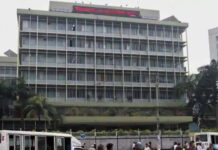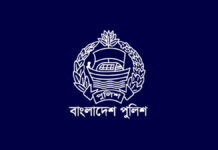Netra News January 6, 2022
Benazir Ahmed, the incumbent Inspector General of the Bangladesh Police, said that he was “shocked” that he, along with the Rapid Action Battalion, an elite police unit which he headed for five years until April 2020, were subjected to US government sanctions, claiming that the decision was based on “distorted information” and on propaganda involving “lies, falsehood and deceit.”
“I would say it was shocking, not surprising. We are shocked. People of this country are shocked.” Ahmed told Ekattorer TV, a pro-Awami League television station, in his first interview since the sanctions were announced.
“In the context of the US-Bangladesh relationship […] such a decision cannot be made. They jumped into this decision based on distorted information, they could have talked with our government before jumping to conclusions,” he stated.
The former RAB director general said that he thought US politicians had been influenced by “propaganda” stemming from the long term machinations of some “anti-state forces” against Bangladesh, “I believe the United States is a great democracy but some public representatives there are creating some sort of nexus with anti state powers [in Bangladesh] and because of their long term efforts, the US administration was influenced and did this.”
On December 10th 2021, the US Treasury Department imposed economic sanctions on RAB and seven senior army and police officers, including Benazir Ahmed, in relation to the organisation’s serious human rights violations. In addition, the US State Department imposed travel sanctions on Ahmed and another RAB officer for his role in one particular extrajudicial execution.
The US Treasury press release noted, “Widespread allegations of serious human rights abuse in Bangladesh by the Rapid Action Battalion (RAB) — as part of the Bangladeshi government’s war on drugs — threaten US national security interests by undermining the rule of law and respect for human rights and fundamental freedoms, and the economic prosperity of the people of Bangladesh.”
It also added, “NGOs have alleged that RAB and other Bangladeshi law enforcement are responsible for more than 600 disappearances since 2009, nearly 600 extrajudicial killings since 2018, and torture. Some reports suggest these incidents target opposition party members, journalists, and human rights activists.”
When asked about killings by RAB — what the authorities call “crossfires” and “gunfights” but the US refers to as “extrajudicial killings” — Ahmed claimed that the unit’s officers complied with the law and, if they did not, were held accountable, “We have to fulfill our responsibilities. Our country will be governed according to its laws, rules, policies and the judiciary system. Our country will run according to its legal mandate. However if there is a violation, if someone violates the legal provisions, there are arrangements for that as well. Now you have to see if any legal provisions were violated in the allegations that have been made. Yes there is something to look into if there are anomalies there. We do not look into such allegations of anomalies, the magisterial authority looks after them, especially, if it is an issue of somebody dying in an operation.”
Ahmed also questioned how Bangladesh’s war on drugs could in any case impact US national security interests, as the US Treasury had claimed, “I do not understand how conducting an anti-narcotics campaign in Bangladesh is a threat to US national security. We are not living on the same continent, we do not have common borders. Those who are involved with drug smuggling in the United States are not the same people who smuggle and peddle drugs in Bangladesh. I think this term was used just for the sake of it, to add more weight to the allegation.”
The current head of Bangladesh’s police also denied that enforced disappearances took place, “A list of 20 individuals was prepared by these NGOs and given to the United Nations saying that they were victims of enforced disappearance. Later we found out that many of them were at home, maybe someone left his home because he was angry, maybe someone left after quarrelling with his wife and then came back. Some of them went abroad.”
He added that these were all “customised reports based on some sort of wish-list.”
Earlier in December 2021, the United Nations working Group on Enforced Disappearances noted that it has received information that nearly 600 people have been forcibly disappeared in Bangladesh by security forces since 2009 — and that while the majority were either released or eventually formally produced in court as arrests, “dozens were found dead” with “86 documented cases in which the victims’ fate and whereabouts remain unknown.”
On December 30th 2021, the law minister, Anisul Huq, said that the Bangladesh government was now investigating “76” of these cases.
The former RAB director general blamed human rights organisations for their role in misleading US politicians, specifically referring to one group whose “South Asia director” was “a Pakistani”. It is not known what organisation he was referring to.
“I wasn’t too surprised because those people who are behind this have been working to this end for a long time. They are not trying to do this secretly or sneakily, they are doing it openly. For example, after this announcement was made, a person wrote ‘Next stop: United Nations, murderers cannot be peacekeepers.’ Look, a Bangladeshi is calling the security forces and police of Bangladesh ‘murderers’. Now you can understand what their motivation is,” he said.
According to Ahmed, Bangladeshi human rights activists and others have for a long time been running a campaign to embarrass the country, the state, and the government, “I think this time was an opportune moment for some special reasons, a favourable moment they utilised to the fullest.”
When Ahmed was asked about the killing in May 2018 of Teknaf City Municipal Councilor Ekramul Haque in Teknaf, which was the reason why the US state department specifically sanctioned him, he said the case is still “open under magisterial inquiry” and he could not comment on a “sub judice” matter.●









